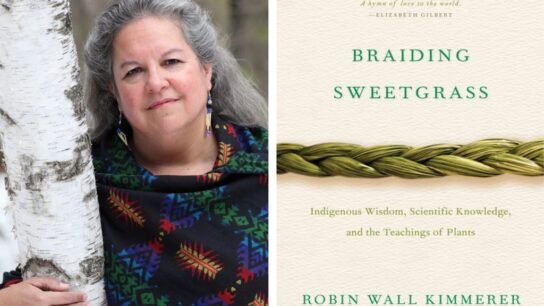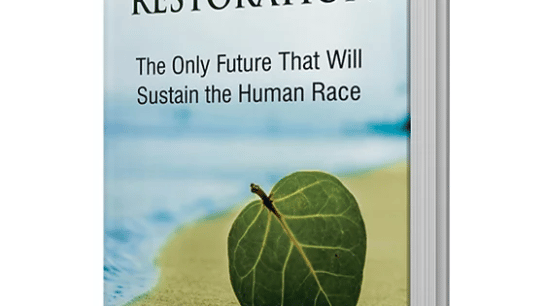First published in 2022, Right Here, Right Now: How Women Can Lead the Way in The Climate Emergency is the second book by Natalie Isaacs, the founder of 1 Million Women. The movement – launched in 2009 in Sydney, Australia (Gadigal Country) – seeks to unite the world’s women in a communal effort to do what they can in their everyday lives to combat climate change. Over one million individuals are now following the collective on social media and/or have signed up on the site.
—
At its heart, Right Here, Right Now is a call to action. Like the broader 1 Million Women collaborative, the book inspires us through optimism, passion, and common humanity. No matter who we are or what our background may be.
In the first chapter – “My Climate Journey” – Isaacs humbly informs us that she did not come to climate activism from a scientific, environmental, or advocacy background; she formerly worked in cosmetics manufacturing and was pretty apolitical. Thankfully, you do not require fancy credentials from an elitist institute, or years of experience working in related fields, to care about the world’s future, to think and write about environmental and societal issues, or to strive for positive change. Caring is enough. Living on Earth is enough. The same as anything, the rest you can learn as you continue along the way. In the chapter, she also acknowledges her privilege as a white Australian woman.
The remainder of this review provides glimpses into the rest of the book’s chapters.
“Our Critical Decade” is placed early in Right Here, Right Now to highlight the urgent need to act on our environmental emergency – now – to reach the 2030 targets. Isaacs writes: “As citizens of Earth, we can’t wait for governments with vested interests in industry and commerce to move at their pace. We can forge ahead and force the pace.” She draws upon the scientific literature (e.g., tipping point scenarios, etc.) to illustrate why this decade is so critical to reducing our accelerated heating. Every year matters. And the clock is ticking.
Moving on, “Optimism as a Strategy” promotes, well, optimism as an alternative to doom-scrolling and as an antidote to despair. The importance of this approach is also reflected in Earth.Org’s Editorial Guideline, which advises writers to be uplifting and to avoid doomsday cul-de-sacs. Hope and optimism. Hope is the lifeblood of us all, after all.
Chapter 4 is titled “Women’s Truth to Power.” Why create a movement focused on women in particular? Why women? Isaacs asks in response: Why not women? It makes sense, considering that females around the globe are disproportionately affected by the repercussions of the climate crisis. Women also tend to hold influential roles within their households, and it is within our homes and daily lives that we can make these small, practical adjustments that, collectively, add up to significant changes. Similarly, Chapter 5 – “Young Women Rising” – covers the fantastic growth in climate leadership among younger women that the world has witnessed over the last several years.
“Become the Storyteller” outlines how storytelling is being used to move individuals. In the reviewer’s opinion, lofty, detached, abstract, academic-style writing isn’t really what moves and inspires people to action. Those ideas are interesting to think about – and that research can be used as convincing evidence. But what wins hearts and inspires action are people’s personal stories, especially ones that are emotional (as an aside: one reason dramatic fiction is so popular). For various reasons (e.g., the limbic system), we remember emotional events and stories better than mundane, humdrum ones. And the words emotion, motion, and motivation originate from the same Latin word: movere, to move.
The following chapter in Right Here, Right Now is “Connect with Country.” For those located outside Australia, “Country” refers to the varied lands, waterways, and seas of the continent. The term’s wider connotations illustrate the reciprocal relationship First Peoples have with nature. Isaacs writes: “It is not enough to simply right past wrongs, which is an ethical imperative. First Nations peoples’ amazing reservoir of knowledge for living in balance with Planet Earth must also be highlighted and honoured.” She emphasises the urgent need, around the globe, to learn from both their combined and contextualised wisdoms.
To learn more about First Peoples, check out this article: How First Peoples Land Management Is Helping Conservation in Australia
Chapter 8 is titled “A Farewell to Consumerism.” Coming from a manufacturing and marketing background, Isaacs explains that she understands “the psyche of the consumer.” At this chapter’s core are fostering a mindful appreciation for the goods we already own and the desire to hold onto them for as long as we can. (For example, although certain major tech companies will tirelessly market the latest models of their annually released phones as must-have items, at the end of the day, the power lies with us as individual consumers. And in our throwaway societies, do we really need to follow the latest fashion trends, especially if they are responsible for fast fashion?)
“The Spirit of Community” focuses on the importance of community building and collective action for positive change. “As we strive to change our world,” Isaacs states, “we can harness the spirit of community. The strength of community is circular. It’s inclusive. Driven by purpose.” Although we can ultimately only act as one person, each of us can inspire and influence. And playing a role within a larger movement, we share connections, knowledge, ambitions, strategies, wins and losses, and highs and lows.
Continuing on, Chapter 10 in Right Here, Right Now is titled “New Dawn for Politics.” The opening paragraph states: “It’s no surprise women are leading the charge within politically engaged communities as well. I keep meeting women who tell me that they’ve had enough of the self-serving crap and lies from politicians.” Those in democratic countries should hold their elected representatives accountable for climate inaction.
“The Day-to-Day Stuff” underscores the power of our individualistic, personal lifestyle choices (particularly, for those of us in First World nations) when multiplied by millions of eco-conscious people. These decisions include, for instance, rejecting a consumerist culture and a disposable mindset; preventing food waste; avoiding single-use plastics, over-packaged goods, and fast fashion; installing solar panels; composting; and eating less meat. Small changes add up, cumulatively speaking.
Looking further ahead, “A New World” shares with us an optimistic vision for a post-2030 world where humans coexist sustainably with the planet – an existence that embraces integrity, fairness, inclusivity, and diversity. And wherein gender justice and climate justice are centred, always. Finally, “Circle of Women” reminds us that here we are, right here and right now, living in a decade that will define the future of life on Earth.
Isaacs writes: “This is climate action, economic prosperity, environmental sustainability, human rights and social justice all rolled together … Every time we prevent greenhouse gas pollution from getting into the atmosphere, we are doing it not just for ourselves but also for our family and loved ones, and the whole of humanity and every species on Earth.”
Right Here, Right Now
Natalie Isaacs
2022, ABC Books, 288pp
Visit 1 Million Women’s website to learn more and get involved in their global efforts.


















